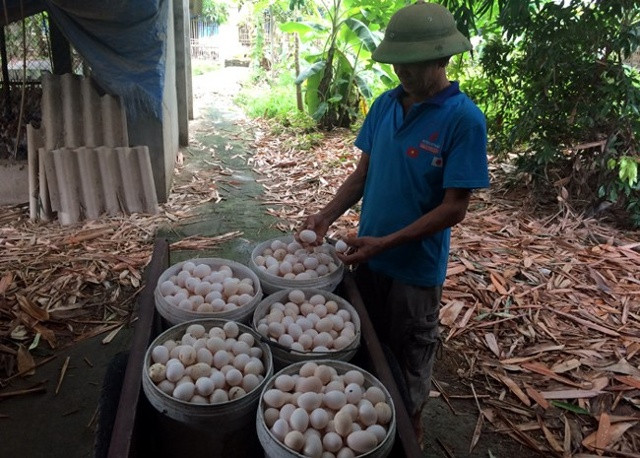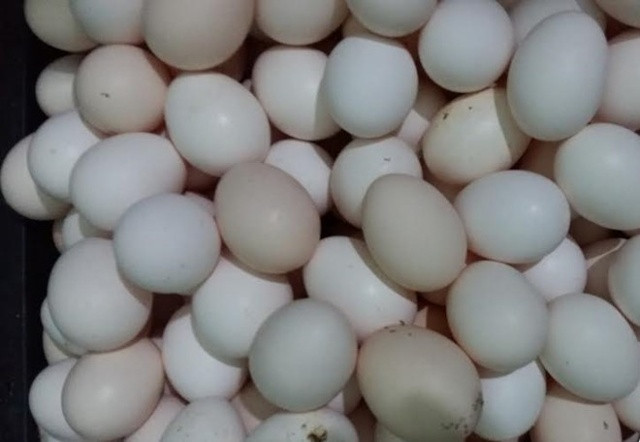Egyptian chicken eggs 'upgraded' to high-quality local chicken eggs
Egyptian white-feathered chicken eggs are white, Egyptian striped-feathered chicken eggs are a slightly darker ivory color. Mixing these two types of eggs together will produce eggs that are identical to genuine local chicken eggs.
Ms. Nguyen Thi Ngoc, a wholesaler specializing in selling eggs to retailers at the Cau Giay market (Hanoi), said that in recent years, people in the capital have become "allergic" to industrially grown foods because they are afraid of toxicity. Everyone is afraid to buy industrial eggs, so they buy more eggs from local chickens, because these chickens only eat corn and rice, so the eggs are guaranteed to be clean and delicious.
Therefore, at the market, industrial chicken eggs with pinkish red color are usually only sold to restaurants, cheap rice shops or bread shops. As for industrially raised Egyptian chicken eggs, which have the same appearance as free-range chicken eggs, retailers often "label" them as genuine local chicken eggs.
According to Ms. Ngoc, egg traders do this just to deceive people, to make it easier to sell, not for profit. Because, if that was the case, they would have to sell at twice the price.
 |
| Egyptian barbed eggs are ivory white, Egyptian white eggs are white |
With the current price of 3,000-3,500 VND/egg, this is the actual selling price of Egyptian chicken eggs, because the wholesale price at the farm is currently 2,000-2,200 VND/egg. From the farm to the consumer (through two intermediaries), the selling price of eggs will differ from the farm price by about 1,000 VND/egg.
"That is the general profit calculation formula for eggs sold at the market that traders often apply," said Ms. Ngoc.
Meanwhile, Mr. Le Van Toan, owner of an Egyptian chicken farm in Tam Duong (Vinh Phuc), shared that taking advantage of the similarity between Egyptian chicken eggs and local chicken eggs, traders often transform Egyptian chicken eggs into genuine local chicken eggs.
According to Mr. Toan, if comparing the nutritional ratio, Egyptian chicken eggs are much better than red industrial chicken eggs, but still inferior to local chicken eggs, even in terms of deliciousness.
Mr. Toan said that there are two types of Egyptian chickens that are commonly raised: pure white Egyptian chickens and striped Egyptian chickens. Pure white Egyptian chickens are usually better at laying eggs, but their eggs are white. When raised, striped Egyptian chickens do not lay as many eggs as white chickens, but their eggs are ivory-colored, like eggs from local chickens.
Mr. Toan revealed that the simplest trick of traders is to use white-feathered Egyptian chicken eggs, which are pure white, and striped-feathered Egyptian chicken eggs, which are slightly ivory-white (slightly darker), and mix these two types of eggs together to get eggs that look exactly like genuine local chicken eggs. After mixing, even people in the trade will have difficulty distinguishing which are local chicken eggs and which are Egyptian chicken eggs.
 |
| The trick of the traders is to put two types of eggs from white-feathered Egyptian chickens with striped-feathered Egyptian chickens to get eggs that look exactly like local chicken eggs. |
In particular, to make people believe that the Egyptian chicken eggs sold in the market are genuine free-range chickens, traders also mix in Egyptian so eggs (first-laying eggs - hen 1) with hen 2 eggs (bigger than hen 1 eggs) so that when sold, buyers will see a mess of eggs, some big, some small, because uneven eggs are a prominent feature of local chicken eggs.
Talking to PV. VietNamNet, an expert in the agricultural sector said that city residents often buy clean food with trust. But their trust is eroded by traders because of tricks and tricks.
For example, pork is turned into beef, wild boar meat; Chinese fruit is turned into American, Australian, Vietnamese fruit; discarded laying hens are turned into free-range chickens... now even Egyptian eggs are "upgraded" into eggs from local chickens.
According to this expert, the tricks of traders in the markets are not necessarily for profit, transforming them into genuine goods to sell at high prices. Many of them "label" only to suit consumer tastes, to make them easier to sell, not to increase prices. However, through such times, consumers lose more confidence in clean food.
“As a result, clean food often becomes unsalable and has no outlet. Farmers have to equate it with selling their clean agricultural products at the market at the same price as unsafe food,” the expert shared.
According to Zing
| RELATED NEWS |
|---|
